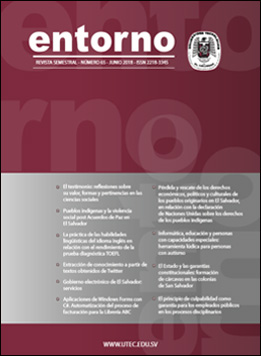Loss and rescue of the economic, political and cultural rights of the indigenous peoples in El Salvador in relation to the United Nations declaration on their rights
DOI:
https://doi.org/10.5377/entorno.v0i65.6054Keywords:
El Salvador - Human rights violation, Human rights-El Salvador, Political anthropology-El Salvador, Indigenous peoples - Legislation, Civil rights - El Salvador, Indigenous peoples of El Salvador - Social aspects.Abstract
This article is the result of a research project related to the loss and rescue of the economic, political and cultural rights of the indigenous peoples in El Salvador; it is also related to the application of their human rights at present, according to the United Nations Declaration on the human rights of indigenous peoples, in contrast with their life conditions in El Salvador. In synthesis, the main thesis is that the intervention of the Salvadorean State is fundamental for the acknowledgement of the rights of the indigenous peoples in relation to their quality of economic, political and cultural life.
Based on the findings, the current economic, political and cultural situation experienced by the different indigenous peoples in El Salvador is harsh, in spite of receiving a small economic assistance from the government. However, this assistance is not enough to sustain the necessary programs for the reactivating of their economy, politics and culture. Politically speaking, they have a voice and a right to vote since they are Salvadorean citizens by birth, nonetheless, they lack the capacity to express themselves socially as indigenous peoples; these are peoples who try to survive the passing of the years. The maximum effort by the State is the innovation of methods to attract tourism. Even so, said peoples are constantly making an effort against many more situations that put their existence at risk. The problem resides in the lack of education on their human rights. This lack of knowledge causes that the indigenous leaders know what place they occupy in the social structure of the country and what the possibilities for their economic, political and cultural participation are. This same lack of knowledge, organization and participation is taken advantage of by the public and private sectors to leave them in oblivion.
The little knowledge acquired about the human rights that both national and international laws establish and that they can apply to their benefit, are among the main causes for the lack of compliance by the Salvadorean State on the human rights of the indigenous peoples.
Therefore, a series of trainings in relation to the human rights of indigenous peoples and the rights established in the Constitution of the Republic has been proposed. Also, there is a proposal for the establishment of agreements with the mass media in order to show the lifestyle of the indigenous population and, based on this, to generate projects for the rescue and valuation of said rights
Entorno, june 2018, issue 65: 69-76
Downloads
960
Downloads
Published
How to Cite
Issue
Section
License
© Entorno
It is required that the authors transfer the right of re-production of their articles to the Entorno Journal

